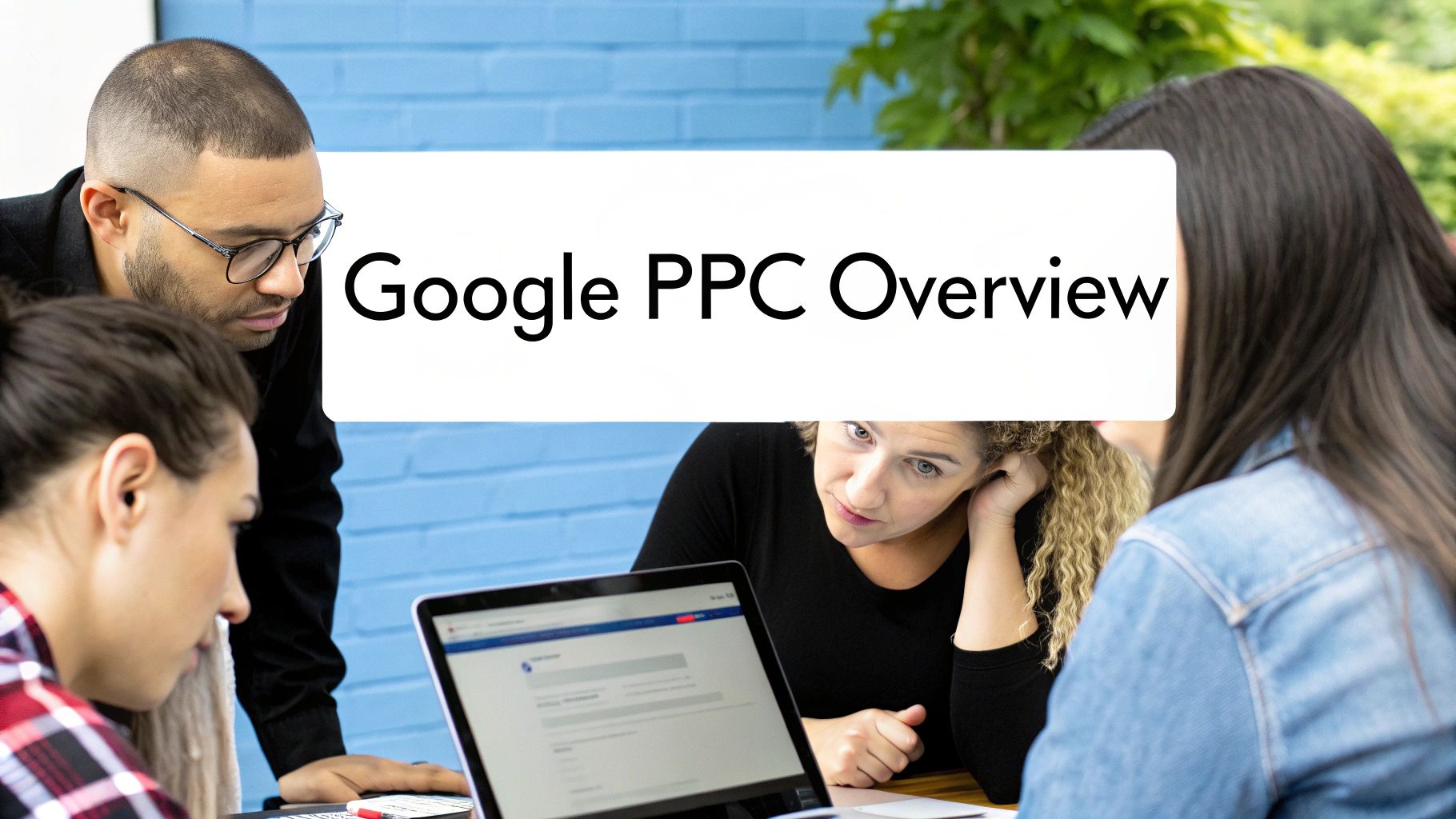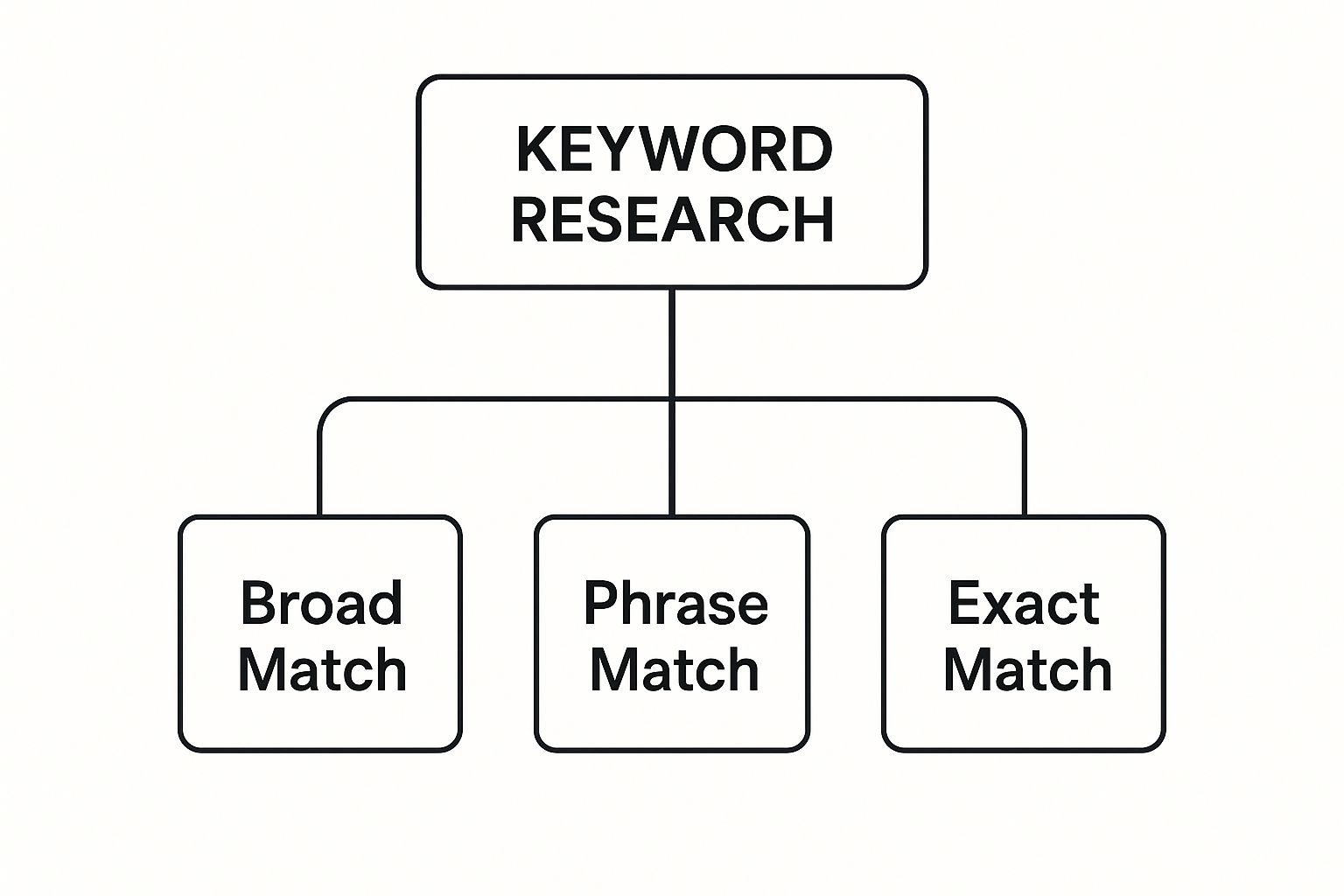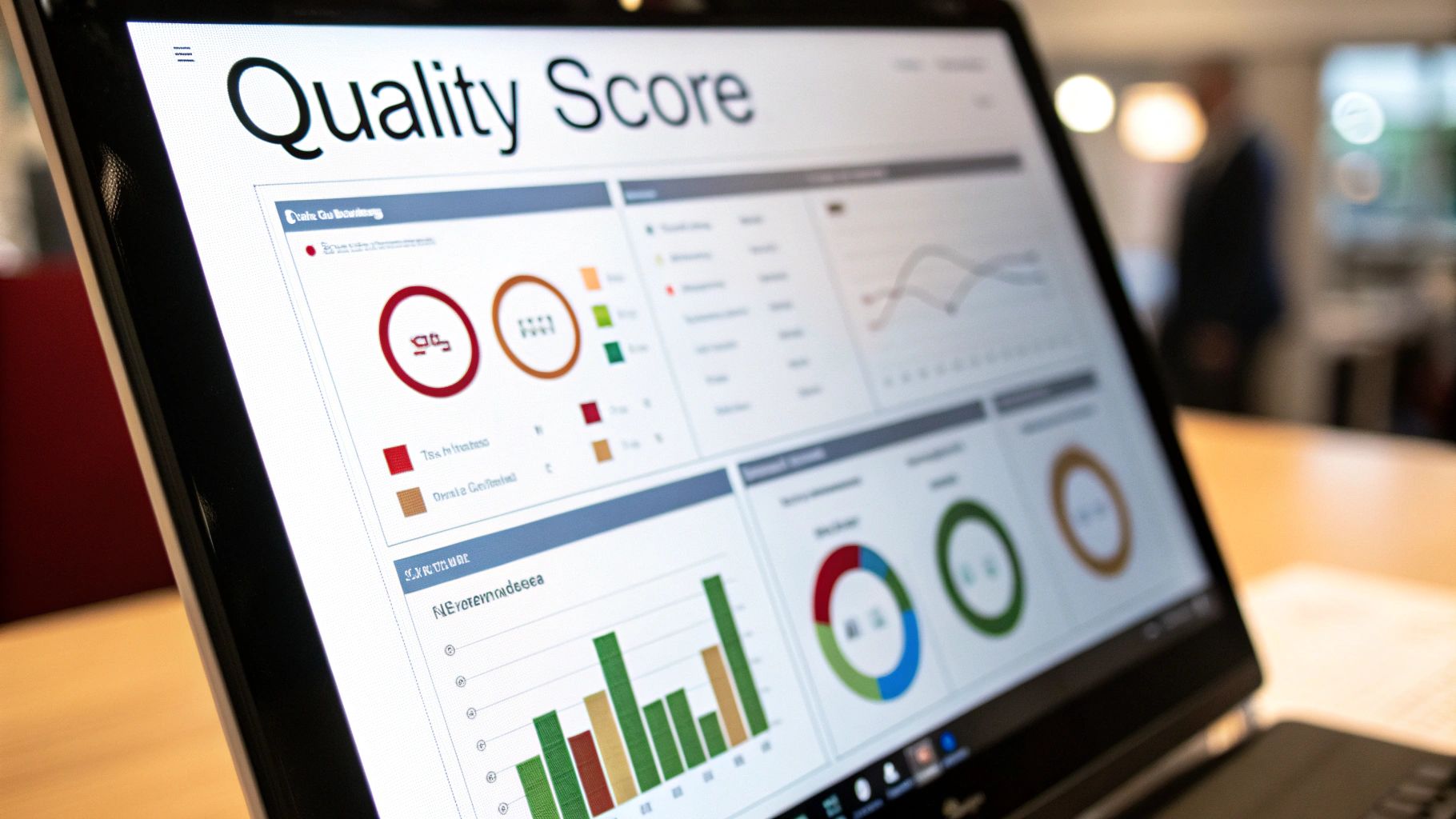How Does Google PPC Work? A Beginner’s Guide

How Does Google PPC Work? Right, before we get properly stuck in, let’s cut to the chase. Google’s Pay-Per-Click (PPC) system is all about getting your ads in front of people on search results pages, but here’s the kicker: you only pay when someone actually clicks on your ad.
Think of it like a super-fast digital auction. Every time someone searches, you’re bidding for their attention. But it’s not just about throwing the most money at it; it’s about being the most relevant result for what they’re looking for.
Your Quick Answer to How Google PPC Works
So, how does all this work in practice? At its heart, Google PPC is a fully automated auction that happens in the blink of an eye, every single time a search is made on Google. As an advertiser, you pick keywords that are directly related to your business and then tell Google the maximum you’re willing to pay for a single click on your ad (Max CPC).
But this whole process is about much more than just who has the deepest pockets. Google also looks at the quality and relevance of your ad using a metric called Quality Score. A higher Quality Score can actually earn you better ad positions and even lower your costs. In short, Google rewards advertisers who create a genuinely good experience for its users.
The entire Google Ads platform is built to connect businesses like yours with the billions of people searching every day, with a big focus on growth you can actually measure.
The Key Components of the PPC System (How Does Google PPC Work?)
To really get your head around how it all fits together, it helps to break the system down into its core parts. Each piece of the puzzle plays a vital role in deciding if your ad gets shown and what you’ll end up paying for that click. If you’re looking for a broader overview, our comprehensive guide to online PPC is a great place to start.
The main components you’ll be working with are:
- Keywords: These are the specific words or phrases people type into Google that you want to trigger your ads. Getting these right is absolutely fundamental to your success.
- Bids: This is simply the most you’re prepared to pay when someone clicks your ad. The good news is, you’re always in control of this figure.
- Ad Quality: This is Google’s assessment of your ad’s relevance, its expected click-through rate, and the experience a user has on your landing page after they click.
Think of it like this: your bid is your entry ticket to the auction, but your ad quality determines how good your seat is. An advertiser with a brilliant, high-quality ad might pay less for a front-row spot than a competitor with a lazy, poor-quality one.
To help you keep track, here’s a quick look at these foundational concepts and what they mean for your campaigns.
Key Google PPC Concepts at a Glance
| Concept | What It Means | Why It Matters |
|---|---|---|
| Keywords | The search terms you target to show your ads. | Connects your ads to relevant user searches. The foundation of your targeting strategy. |
| Bids (Max CPC) | The maximum amount you’re willing to pay for a single ad click. | Controls your spend and determines your eligibility to enter the ad auction. |
| Quality Score | Google’s rating of your ad, keyword, and landing page quality. | A higher score can lead to better ad positions and lower costs, rewarding relevance. |
Getting a solid grasp of these three pillars is the first major step towards building a successful Google Ads strategy that doesn’t just spend money, but actually makes it.
How Does Google PPC Work? The Google Ads Auction Explained
At the very heart of Google Ads is a lightning-fast process called the ad auction. Every single time someone searches on Google, an auction kicks off behind the scenes to decide which ads get shown, and in what order. But it’s a whole lot smarter than a simple ‘highest bidder wins’ scenario.
Think of it less like a stuffy art auction and more like a talent show. Your bid is just your entry fee; it gets you in the door. It’s your performance—how relevant and high-quality your ad is—that really determines whether you get the top spot. This system is designed to make sure users see genuinely useful ads, not just ads from the companies with the deepest pockets.
To do well here, you need to get to grips with the two critical factors Google looks at in a fraction of a second.
Your Bid vs Your Quality
The auction outcome all comes down to two key ingredients that get mixed together to determine your ad’s final position:
- Your Maximum Bid (Max CPC): This is the most you’re prepared to pay for a single click on your ad. You set this in your Google Ads account, so you’re always in control of your spend.
- Your Quality Score: This is a diagnostic score Google gives you, from 1-10, that rates the overall quality of your ad. It looks at things like how relevant your ad is to the keyword, the chances a user will actually click it, and the quality of the experience on your landing page.
These two things are multiplied to create a final score called Ad Rank.
Ad Rank = (Your Maximum Bid) x (Your Quality Score)
The advertiser with the highest Ad Rank wins the top position. The second-highest gets the second spot, and so it goes down the page. Understanding this dynamic is absolutely central to making Google Ads work for you.
Why a High Quality Score is Your Secret Weapon
This formula reveals a powerful truth about Google Ads: a high Quality Score is a massive advantage. An advertiser with a brilliant Quality Score of 9/10 could easily outrank a competitor with a poor score of 2/10, even if that competitor is bidding a lot more money. Google actively rewards advertisers who create a great user experience with better positions and, often, a lower actual cost-per-click.
For businesses looking to get ahead, mastering the different keyword match types is a fundamental step toward improving relevance and, in turn, your Quality Score. This infographic breaks down how match types form the foundation of your targeting strategy.
This hierarchy shows that your choice of match type directly impacts how precisely you target user searches—a key part of ad relevance. To dive deeper into this and other powerful techniques, explore our guide on mastering Google Ads PPC with advanced strategies to move beyond the basics. Focusing on quality isn’t just good practice; it’s a direct route to better performance and a much more efficient budget.
How Does Google PPC Work? Choosing Keywords to Reach Your Audience
Keywords are the absolute bedrock of any successful pay-per-click campaign. They are the essential bridge connecting what someone types into Google with the ad you want them to see. Get this part right, and you stop hoping for clicks and start strategically targeting the right people at exactly the right time.
Don’t just think of keywords as single words; see them as signals of a person’s intent. Someone searching for “running shoes” is in a completely different headspace to someone searching for “buy size 10 Nike Pegasus running shoes”. Your job is to align your keyword choice with that user’s intent. Luckily, Google gives you a powerful set of controls to do just that: match types.
Understanding Your Keyword Control Panel
Match types are basically settings that let you control how closely a user’s search has to match your keyword for your ad to even be considered. Each one strikes a different balance between reach and relevance, giving you the power to fine-tune your targeting.
- Broad Match: This is the widest net you can possibly cast. Your ad can show up for searches that are simply related to your keyword, including synonyms and other variations. It’s fantastic for discovering new search terms you hadn’t thought of, but you have to watch it carefully to avoid attracting irrelevant traffic.
- Phrase Match: This gives you a much tighter grip on the reins. Your ad will appear for searches that include the meaning of your keyword. For example, the phrase match “tennis shoes” could show up for “buy tennis shoes for men” but would rightly be excluded from a search for “running shoes”.
- Exact Match: This is your sniper rifle. Your ad will only appear for searches that have the very same meaning or intent as your keyword. This brings in highly relevant traffic, but as you’d expect, the search volume is much lower.
The real skill in Google PPC isn’t just picking keywords. It’s about mastering the interplay between these match types to control precisely who sees your ads and when.
The Power of Negative Keywords
Just as vital as choosing what you do want to target is deciding what you don’t. This is where negative keywords come into play. These are simply terms you add to your campaign to stop your ad from showing up on searches that are a waste of your budget.
For instance, if you sell premium, high-end furniture, you’d be wise to add words like “cheap,” “free,” and “second-hand” as negative keywords. This one simple action prevents you from wasting money on clicks from people who are clearly not your target customer. It instantly improves your campaign’s efficiency and return on investment.
This whole process transforms your strategy from just picking words to building a precise, highly-targeted audience. By layering these keyword controls with other targeting options like location, device, and demographics, you can zero in on your ideal customer with incredible accuracy. This focused approach is what separates a profitable PPC campaign from a money pit.
How Does Google PPC Work? Managing Your Bids and Budget Effectively
Getting your budget and bidding strategy right is the line in the sand between a profitable Google Ads campaign and just throwing money at the wall. When you know how to steer your spend, you’re in control. You can chase your goals, whether that’s getting more eyes on your website or bringing in sales leads, without the fear of an unexpectedly huge bill.
First things first, you need to set a realistic daily budget. Think of this as telling Google, “On average, this is what I’m comfortable spending each day.” Google’s system is smart and flexible; some days it might spend a bit more if there’s a great opportunity, and other days a little less. The important thing is that you’ll never be charged more than your monthly charging limit – that’s simply your daily budget multiplied by 30.4 (the average number of days in a month). This gives you a predictable ceiling on your total spend. For a deeper dive, check out our beginner’s guide to PPC budget control.
Manual vs. Automated Bidding
Once your budget is locked in, you have to decide how you’re going to bid in the auction. This decision boils down to two main paths:
- Manual Bidding: This puts you firmly in the driver’s seat. You set a specific maximum cost-per-click (Max. CPC) for your keywords, meaning you’ll never pay more than that for a single click. It’s perfect for advertisers who want granular, hands-on control over every aspect of their account.
- Automated Bidding: This is where you let Google’s AI do the heavy lifting. It works to optimise your bids based on your specific campaign goal, crunching mountains of data in real-time to set the perfect bid for every single auction. It’s a task that’s simply impossible to do by hand.
For most advertisers, especially if you’re just getting to grips with how Google PPC works, automated bidding is the way to go. It saves a massive amount of time and uses powerful machine learning to hit your targets far more efficiently.
Choosing the Right Automated Strategy
Google doesn’t just offer one automated strategy; there are several, each built for a different business objective. Picking the right one is absolutely critical to your success.
Here are a couple of the most popular choices:
- Maximize Clicks: The goal is simple: squeeze as many clicks as possible out of your budget. This is a brilliant strategy for campaigns focused on driving traffic to your website to build brand awareness or grow your mailing list.
- Target CPA (Cost Per Action): This strategy is all about getting conversions (like a sale or a contact form submission) at a specific cost you’re happy with. If you know a new lead is worth £50 to your business, you can set your Target CPA to £50, and Google’s algorithm will work to deliver conversions at that average cost.
The real secret is to match your bidding strategy directly to what you actually want to achieve. Don’t optimise for clicks when what your business really needs are sales. A clear, aligned goal makes your entire budget work smarter, not just harder.
The cost of these clicks can swing wildly. While you might see scary global averages, here in the UK, the cost per click can be as low as £0.09 to £0.40. UK businesses often run campaigns with monthly budgets anywhere from £80 to £8,000, which just shows how accessible it is for small advertisers and how scalable it is for big players. You can discover more UK-specific Google Ads statistics to get a better feel for the local market. It’s this flexibility in both bidding and budgeting that makes Google Ads such a potent tool for businesses of all shapes and sizes.
How Quality Score Impacts Your Success
While your bid is your ticket into the ad auction, your Quality Score is the secret weapon that dictates how well you do once you’re in. Think of it as Google’s overall health check for your ads, keywords, and landing pages, rated on a simple scale from 1 to 10.
A high Quality Score is your fast track to better results. It has a direct impact on your Ad Rank, which means a strong score can land you higher ad positions for a lower cost-per-click (CPC). It’s Google’s way of rewarding advertisers who put the user first, making Quality Score a central pillar of any smart PPC strategy.
The Three Pillars of Quality Score (How Does Google PPC Work?)
That score isn’t just a number plucked from thin air. It’s a calculated metric based on three core components. If you want to raise your overall score—and see your campaign success climb with it—you need to focus on improving each of these areas.
Here are the main factors at play:
- Expected Click-Through Rate (CTR): This is Google’s prediction of how likely your ad is to be clicked when shown for a keyword. It’s not a guess; it’s heavily informed by your ad’s historical performance.
- Ad Relevance: This simply measures how well your ad copy aligns with the intent behind a user’s search. If someone types in “men’s leather boots,” they should see an ad for exactly that, not a generic one for “men’s shoes.”
- Landing Page Experience: Once someone clicks, what happens next? This factor assesses how relevant and user-friendly your landing page is. Google looks at things like page load speed, mobile-friendliness, and whether the page delivers on the promise made in the ad.
A high Quality Score is a signal to Google that your ad is a fantastic match for what the user is looking for. In return, Google is more likely to show your ad in a top spot, often for less money than a competitor with a lower score.
This obsession with user experience is non-negotiable, especially in a crowded market. With Google holding a staggering 93.51% of the UK search engine market, delivering a quality experience is vital. The average click-through rate in the UK is reportedly around 7.37%, which is higher than in many other regions. This suggests that UK searchers are particularly responsive to relevant, high-quality ads. Discover more insights about Google Ads statistics.
Ultimately, understanding how Google PPC works means realising it’s not just an auction of who bids the most, but an auction of quality. By writing compelling ads and creating a seamless landing page experience, you’re not just ticking a technical box. You’re building the foundation for sustainable, cost-effective success.
How Does Google PPC Work? Turning Campaign Data into Actionable Insights
Getting your Google Ads campaign live is just the first step. The real magic, and the real profit, comes from what you do next: continuous, data-driven optimisation. This is where you stop guessing and start turning raw numbers into a refined strategy that actually boosts your bottom line.
Think of your campaign data as direct feedback from your target audience. Every single click, conversion, and impression tells a story about what’s hitting the mark and what’s falling flat. Your job is to listen closely to this feedback and make smart, calculated adjustments. It’s this ongoing process that separates the campaigns that fizzle out from the ones that deliver exceptional long-term growth.
The first step? Knowing which numbers actually matter. Google Ads can throw a sea of metrics at you, but focusing on a handful of key performance indicators (KPIs) will keep you from getting lost in the noise.
Core Metrics for Campaign Analysis
To get a quick pulse on the health of your campaigns, you need to keep a regular eye on these essentials. Together, they paint a clear picture of user engagement, ad performance, and, most importantly, profitability.
- Click-Through Rate (CTR): This is the percentage of people who click your ad after seeing it. A high CTR is a fantastic sign that your ad copy and keywords are resonating with what people are searching for.
- Conversion Rate: This tracks the percentage of clicks that lead to a valuable action – a sale, a form fill, a phone call. This is the ultimate test of whether your ad and landing page are working together effectively.
- Return On Ad Spend (ROAS): This is the metric your finance team cares about. It calculates the total revenue you generate for every pound you spend on ads, telling you in no uncertain terms if your campaigns are actually profitable.
The goal isn’t just to get clicks; it’s to get the right clicks. Analysing these metrics together reveals the bigger picture. For instance, a high CTR paired with a low conversion rate often points to a major disconnect between what your ad promises and what your landing page delivers.
To truly connect the dots between ad spend and revenue, it’s vital to master how to set up Google Analytics conversion tracking. This is what allows you to see exactly how your ad performance translates into on-site user behaviour and tangible results.
Making Data-Driven Decisions
Once you have the data, it’s time to act. Reviewing reports and making informed changes is fundamental to understanding how Google PPC works as a living, breathing system.
For example, you should be living in the search terms report. This is a goldmine that shows you the actual search queries that triggered your ads. It’s the fastest way to find irrelevant terms that are wasting your money, allowing you to add them as negative keywords and stop the bleed immediately.
It also uncovers new, high-intent keywords you might have completely missed. Performing these checks routinely is a non-negotiable part of the optimisation process. To get a deeper understanding of this, our guide explains in detail how to audit your PPC ads effectively. This constant cycle of analysis, testing, and tweaking is what turns a decent campaign into a great one.
Your Google PPC Questions, Answered
Jumping into the world of Google Ads can feel like learning a new language, and it’s natural to have questions. Getting your head around the common queries is the best way to build confidence and understand how Google PPC really works on the ground.
Let’s get straight to it and tackle some of the biggest uncertainties we hear from clients.
How Much Should I Actually Spend on Google Ads?
This is the million-dollar question, isn’t it? The honest answer is: it depends. There’s no one-size-fits-all magic number, as your budget is tied directly to your industry, goals, and even where you’re targeting.
Many UK small businesses find their feet with a budget somewhere between £1,000 to £2,500 per month. That said, you can absolutely start smaller – even £20-£50 a day can get the ball rolling and start gathering crucial data.
The most important thing is to set a daily average budget you’re comfortable with. Google’s system is designed for predictability. While it might spend a little more or less on a particular day to catch opportunities, it will never charge you more than your monthly spending limit (your daily budget x 30.4). This gives you solid control over your costs.
How Long Until I See Real Results?
Patience is a virtue in PPC. While you can start driving traffic to your site almost immediately after a campaign goes live, seeing meaningful, profitable results is another story.
You’ll get your first batch of performance data within a few weeks, but a campaign really needs at least three months to mature. This is the sweet spot for collecting enough data to properly A/B test your ads, tweak your landing pages, and refine your keyword strategy. Think of it as a marathon of continuous improvement, not a sprint to the finish line.
Key Takeaway: Judging a campaign in its first week is a recipe for disaster. You need to give your strategy time to breathe and let the data tell you what’s working. The goal is to gather enough insight to make smart, informed decisions that will drive long-term, sustainable growth for your business.
Ready to stop guessing and start getting real results from your advertising spend? The experts at PPC Geeks can create a data-driven strategy to boost your traffic, leads, and sales. Get your free, in-depth PPC audit today.
Author
Search Blog
Free PPC Audit
Subscribe to our Newsletter
The Voices of Our Success: Your Words, Our Pride
Don't just take our word for it. With over 100+ five-star reviews, we let our work-and our satisfied clients-speak for us.
"We have been working with PPC Geeks for around 6 months and have found Mark and the team to be very impressive. Having worked with a few companies in this and similar sectors, I rate PPC Geeks as the strongest I have come across. They have taken time to understand our business, our market and competitors and supported us to devise a strategy to generate business. I value the expertise Mark and his team provide and trust them to make the best recommendations for the long-term."
~ Just Go, Alasdair Anderson




